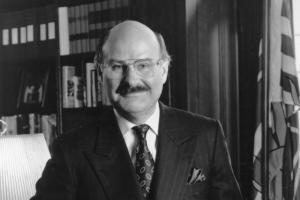
Michael Franklin Harcourt, mayor of Vancouver from 1980 to 1986, and premier of British Columbia from 1991 to 1996, “never planned to go into politics.” The progression into politics, however, seemed natural for someone who decided to study law because he “wanted to make change.”
Harcourt was born in 1943 in Edmonton, Alberta and grew up in Kerrisdale. It was in the 1960s when Harcourt started to take an interest in politics. He became interested in the CCF after meeting Tommy Douglas. He earned the moniker “Ho Chi” Harcourt for his leftist leanings, although he describes himself as more centrist than a lot of his contemporaries. “I knew the radicals,” he says, “but they were just too radical.”
After completing his Bachelor of Arts at UBC, Harcourt was torn between enrolling in graduate studies in political science or enrolling in law school; he settled for the latter and entered in the fall of 1965. At the time, there was a great deal of interest in social justice in both Canada and the United States. Lyndon Johnson had established the Legal Services Program in Seattle, specializing in poverty law. In Canada, Trudeau was pursuing his own vision of “The Just Society”.
After completing his articles, Harcourt went to work with the Law Students Legal Advice Program (LSLAP), and also helped to establish the Legal Aid Society of British Columbia. At the time there was “no opposition to the creation of legal aid,” says Harcourt. These clinics were pivotal to addressing the legal needs of people in Vancouver.
The fight against “Urban Renewal” was the final goad that drove Harcourt into politics. Throughout the 1950s and 1960s large swaths of Vancouver’s Eastside were slated for demolition. Harcourt was approached to help in the legal fight against the extension of the Trans-Canada Highway into Strathcona, a plan opposed by residents of the area. It was through this successful endeavour that Harcourt decided to run for politics. In 1972 he decided to run for council himself, and he served as alderman from 1973 to 1980. He went on to become mayor of Vancouver from 1980 to 1986.
In 1986 he left civic politics for provincial politics, and spent 5 years in opposition before winning the 1991 election as leader of the NDP. Harcourt is proud to say that as premier he “recognised the treaty process [with British Columbia’s Aboriginal peoples]” and “ender the War in the Woods.”
Looking back on his studies, Harcourt remembers law school as “very conservative.” Perhaps the greatest change to law school between 1968 and today, Harcourt muses, is that the law school has become more inclusive and more egalitarian.
For more, read Profile of Mike Harcourt from the UBC Law Alumni Magazine, Spring 2006., listen to the Allard Law History Project interview with Mike Harcourt, and view the UBC Legacy Project Interview with Mike Harcourt.
First published on August 22, 2016.